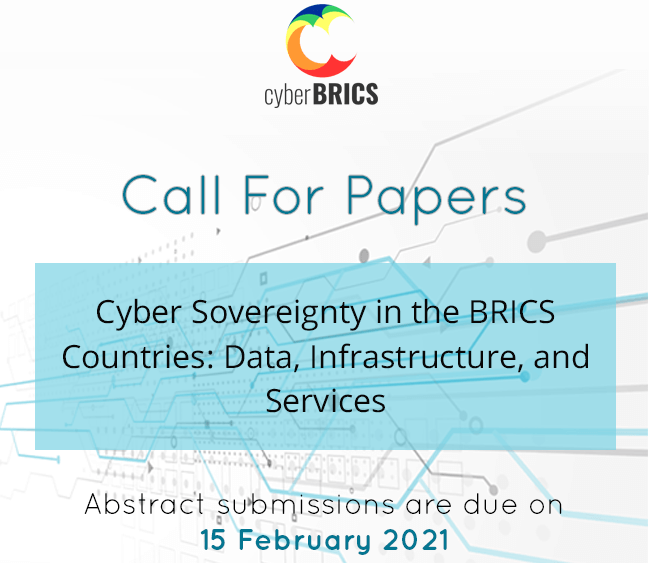CfP Cyber Sovereignty in the BRICS Counties: Data, Infrastructure and Services
News | 04-12-2020 13:57
Digital Sovereignty in the BRICS:
While once imagined as an instrument for a borderless “global village,” the Internet is currently undergoing complex processes of re-nationalization (e.g. China, Russia, India) and regionalization (e.g. EU). BRICS countries, like many others around the world, are grappling with conflicting sets of realities and desires: individual privacy and national security, data localization and cross-border data flows, digital independence and international technological trade, often driven by concurrent national priorities, international commitments, and ambitions for global expansion and influence.
The book volume aims at offering answers to such compelling questions, providing valuable – and so far, very limited – insights on digital policies of the BRICS grouping, with particular regard to evolving notion of Digital Sovereignty and its heterogeneous interpretations and practices. The publication wishes to gather contributions based on rigorously collected evidence that can be used by researchers, regulators, and businesses alike.
Authors of selected contributions will be invited, with the help of a limited number of travel grants, to present their draft papers at the BRICS Data Protection and Digital Sovereignty Conference, organised as a side event of the Latin American edition of the Computers, Privacy and Data Protection Conference (CPDP LatAm), in July 2021, in Rio de Janeiro.
Call for Papers:
This publication aims at developing a ground-breaking interdisciplinary body of research on Digital Sovereignty by focusing on related discourses, legislations and regulations, and technological projects developed by BRICS countries to (re)assert their Digital Sovereignty. We welcome submissions from a wide range of disciplines such as communication, law, security studies, information science, political science, public administration, public policy, international relations, area studies, sociology, anthropology, etc. Suggested topics include analyses of, inter alia:
• The conceptualization of Digital Sovereignty in a specific member of the BRICS grouping or from a comparative perspective
• Taxonomies and categorizations of Digital Sovereignty
• Theoretical, empirical, or comparative analysis of data localization policies in BRICS countries
• Theoretical, empirical, or comparative analysis of cyber-industrial plans and strategies aimed at national self-reliance and independence in BRICS countries
• Analysis of infrastructural policies adopted by BRICS countries to interpret, implement and actualize sovereignty in cyberspace
• Tensions between national policies and international commitments, for instance, in international digital trade agreements, AI policies, and technological imports/exports
• Global South alliance and tensions among BRICS countries in their quest for alternatives to Silicon Valley-based development models
• BRICS countries’ resistance to data colonialism from the Global North and new forms of data colonialism emanating from new digital powers (e.g. China’s digital silk road initiative)
• Case studies analysing specific laws, regulations, or decisions of Digital Sovereignty (e.g. the Russian “Sovereign Internet Law”, the Indian prohibition of 57 Chinese apps, etc.)
• Case studies exploring the use of specific infrastructure-related programmes and initiatives to implement Digital Sovereignty (e.g. the Russian “Runet” or the “Great Firewall of China”)
• Case studies discussing how the digitalisation of specific public services contributes to the construction of a national Digital Sovereignty (e.g. the Indian “Aadhaar” Digital Identification system)
Submission Guidelines:
Draft papers will be considered for inclusion in the publication only if they have not been previously published. The length of the abstract submissions should be between 1500 and 2000 words. The length of the final submissions should be between 7000 and 10000 words. To facilitate the reviewing process, papers should not include author names or other information that would help identify the authors. All submissions shall be in English language. Citation should be in APA 6 style, authors shall use footnotes rather than endnotes and submission should be in Microsoft Word or OpenDocument Text format.
Abstract submissions are due on 15 February 2021. They should include the following elements:
• Title
• Extended abstract (1500-2000 words)
• Author’s name, affiliation and short bibliographical note (in the body of the email)
Authors will be notified within approximately 3 weeks of the abstract submission deadline as to the status of their contributions.
All submitted papers will be subject to peer review. PLEASE note that every author submitting a paper will be asked to peer review another submission, which will be judged based on the novelty of the contribution, the theoretical soundness, and the quality of presentation.
Authors of the selected submissions will be invited to submit the first drafts of their paper proposals (7000-10000 words) by 10 June 2021.
Authors will be given the opportunity to improve their contributions based on peer comments. To receive further comments and feedback, authors will also be invited to present their work in-progress at the BRICS Data Protection and Digital Sovereignty Conference, organised as a side event of the Latin American edition of the Computers, Privacy and Data Protection Conference (CPDP LatAm), in July 2021, in Rio de Janeiro, Brazil. at CPDP LatAm in Rio.
Final drafts (7000-10000 words) are due on 10 September 2021.
All submissions shall be sent to Dr. Luca Belli (luca.belli@fgv.br) and Dr. Min Jiang (min.jiang@uncc.edu) with “Submission BRICS Digital Sovereignty” as your email subject.
Read more at https://cyberbrics.info/call-for-papers-cyber-sovereignty-in-the-brics-countries-data-infrastructure-and-services/
back

